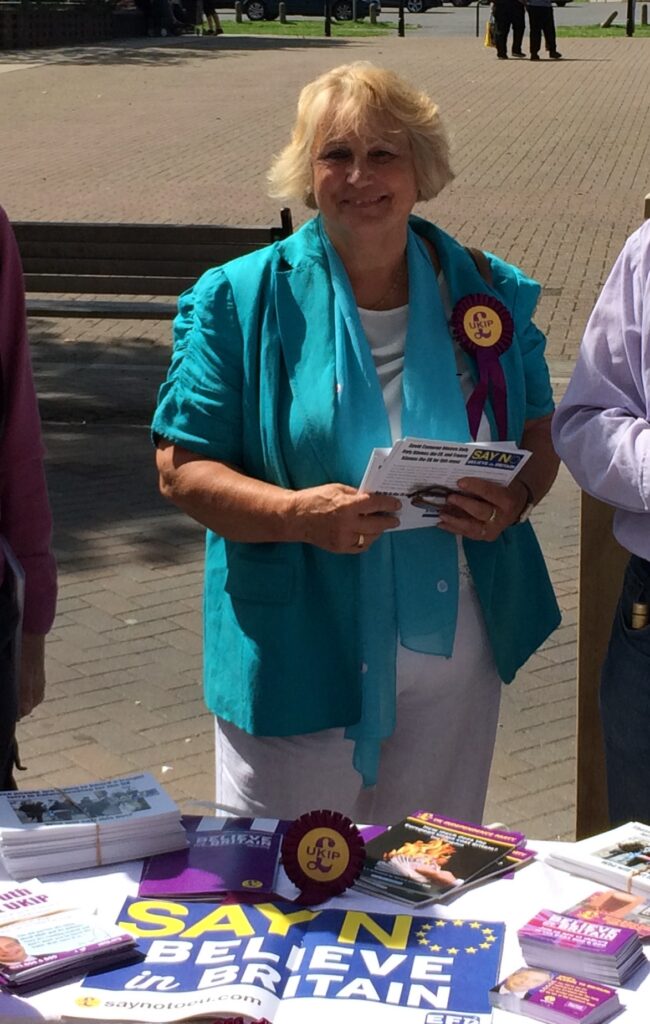As a group that came together to fight a referendum on membership of the EU, we thought we would ask you, what your views are on Net Zero, a possible Referendum, and more generally the environment.
Part 3 in our series of your views. More responses can be found from Part 1 and Part 4.
Thanks to Nick Mane, Dan Liddicott, Mal McDermott and Mary Lawes for their responses.
“We need a full scientific evaluation, a full understanding of cost/benefits, otherwise, what is the point of a referendum”

Local Brexiteer Nick Mane.
Before considering a referendum, I believe it’s vitally important we fully evaluate the full implications of going electric.
- Nuclear is not clean, it has radioactive waste, where do we store this?
- A massive increase in usage will entail a massive increase in electricity production, will more nuclear power stations be safe from :-
a) natural disaster
b) conventional terrorism
c) hackers (including rogue states, terrorists and spotty teenager geeks)
d) will over reliance on one fuel cause potentially catastrophic breakdowns in essential infrastructures such as heating, logistics, water treatment centres etc.
e) the real cost of alternative energy sources such as the production carbon footprint of wind farms and the escaping gasses from wind captured electric switching gear. It seems there is no foresight.
- The danger from computer viruses to infrastructure.
We need a full scientific evaluation, a full understanding of cost/benefits, otherwise, what is the point of a referendum if people don’t know all the facts?
“if ‘climate change’ is not ‘man made’, but part of a natural cycle – something many scientists believe – then none of the great power grab and associated loss of liberty is necessary”

Dan Liddicott is part of the Independent Libertarians group. He often contributes to our site, and can be heard on our Podcast from last year.
The earth centric view of the universe is back! Not quite abandoning Copernicus and Gallileo, but getting there. The belief that climate change is man-made in spite of repeated bad predictions and a relatively tiny window of observation is in my view the equivalent of being a flat-earther – because the horizon looks flat from here. How convenient that this worldview becomes the excuse to give more money and power to those who like having money and power – I’m sure there’s no connection.
Is global warming a threat?
It’s important to separate the notion of ‘global warming’ (now more expediently called ‘climate change’ for lots of inconvenient reasons) from the notion of anthropogenic, or manmade, climate change. They are not the same thing, yet the obfuscation and equivocation around the differences has only served to muddy the waters of the debate. The difference between ‘climate change’ and ‘man made climate change’ is fundamental to what happens next. If ‘climate change’ is ‘man made’ then it stands to reason that it can be ‘man un-made’ by changing our behaviours accordingly. This is the explanation those in power are pushing onto us and, no surprise, their proposed solution is to give them even more power and money to control our lives. Once they get a bit of power there is just no stopping them. However, if ‘climate change’ is not ‘man made’, but part of a natural cycle – something many scientists believe – then none of the great power grab and associated loss of liberty is necessary, and Net Zero is a complete non-requirement. There’s a lot of power and money hanging on the difference between ‘man made’ and ‘not man made’ – the effect of that on the motives, biases and actions of those seeking power is worth thinking about.
In my opinion the arguments in favour of the ‘natural cycle’ causes of changes to climate are more convincing. This doesn’t mean there is nothing to be done, it means those things which are to be done are very different things. Pursuing Carbon Zero becomes pointless, indeed it would be detrimental to what needs to be done. And penalising people for being productive, warm, and free is also pointless. Instead efforts should be directed toward living with the changes to climate, rather than futile King Canute style attempts to command the tide to turn back.
Should we have a referendum on enforced Net Zero targets?
A referendum on ‘Global Warming’ or ‘Climate Change’ feels a bit like voting to decide whether the world is flat – it makes no difference to reality, but having decided everyone will accept policy which imagines the world the way they voted. Of course it comes down to the precise questions asked in a referendum, but sadly I think most would decide on balance that the world is ‘flat’ and a referendum would simply be an exercise in validating the direction the ‘powers that be’ wish us to travel. We’ve been relentlessly fed just one narrative – that climate change is caused by human activity and can be stopped by changing human activity. I do not believe either statement is the whole truth and great damage to communities, families and individuals will occur when false policies are pursued which erode liberty, economic freedom, and increase central planning and control in pursuit of something that will ultimately fail to deliver.
Viewing the possibility of a referendum more optimistically, a referendum could provide the space to present the truth about climate change more openly and freely. To have that opportunity to present the facts which are ignored by the MSM and politicians, but which are material to the case, is essential. If a referendum is the way to do it, then let’s do it. I’m sure the ‘fact checkers’ (censors) will be out in force, along with cranks real and planted, so it will be a war of words to be sure. But a necessary one I feel, if we are to have any chance of keeping the door open to freedom. We can’t let the climate ‘flat earthers’ get their way without a fight.
What action should we be taking on the environment?
None of this is a reason to not care for the planet, and look after the environment for ourselves and future generations, but it makes a huge difference to where we direct our attention. Effort should be directed toward living with the inevitable and unstoppable changes to climate – be that better river management, better forest management, better agriculture and food production, better water management, better guidance on where and how to build, for instance. All of which can be more easily and effectively solved through the collective ingenuity of the free market providing effective and cheap solutions to all these problems. This seems obvious to me on two fronts. First, because I find the ‘natural cycle’ arguments more convincing, and second, because even if I didn’t the reality is that the efforts of the UK to achieve Carbon Zero are not being matched by the biggest carbon producers at all. This means whatever we do to reduce Carbon in the UK will make no material difference to the global outcome. To pursue Zero Carbon on those terms would be a self-destructive act of futility. We’d trash our economy, cut great swathes through individual liberty, and achieve nothing – nothing except giving power and money to people who want more power and money. Whichever way you look at it, whether you agree with me about the natural cycle or not, the only logical approach the UK could take is one of preparation, and mitigation of effects. The most destructive part of pushing the man-made climate change argument is that we will find we were wrong, and having failed to both prevent change and to prepare for it, the impact on people will be devastating. We can either learn to live with change, or reap the consequences of not preparing. Nothing the UK does can prevent change.
“International pressure on Russia, China and India would be better overall as the UK’s output pales into insignificance when compared to these nations”

Libertarian Malachy Mcdermott. You can read Mal’s interview with us, or listen to him on our podcast.
Is global warming a threat?
Yes, I believe that global warming is real and that the data shows this to be the case. Man-made global warming is a reality that we have to deal with, the physical evidence has been quite clear in the last decade or so, ignoring this problem will soon be impossible as every year it comes closer to our doorstep.
Should we have a referendum on enforced Net Zero targets?
No, I think it’s a bad road to go down to have a referendum on economic affairs. I disagree with the need for Net Zero targets to be enforced by law as demand is shifting away from these types of industries anyway. International pressure on Russia, China and India would be better overall as the UK’s output pales into insignificance when compared to these nations. A “buy clean” policy in which the state promotes local manufacturing that is environmentally friendly as a direct competition to imported goods that have a heavy carbon footprint would be a vastly superior way of tackling this issue globally.
What action should we be taking on the environment?
Unfortunately, except for small scale, individual consumption changes, there is not much more the average person can do, we are really at the whims of foreign powers who are refusing to change with any kind of expedience, not to mention the fact that it is of benefit to many of these countries that global warming continues (Russia becomes more and more arable every year as the temperature changes). What we need is more resolute political action to stand up to these powers regardless of what they are capable of, if you are on the right side, should you not fight for that position?
“The plans of the government will harm the poorest in our country. We cannot leave the poorest people without heat for their homes. We need to build more nuclear plants. While the hypocrisy of leaders from around the world fly in to COP26”

Cllr Mary Lawes of the Foundation Party shares her views. Mary is on Twitter and Facebook. You can also read our interview with Mary and listen to her on our podcast.
Is global warming a threat?
The simple answer would be yes. What I would like to see is all the alarmism and hysteria stop. The debate has not really been held by the scientists on both sides of the arguments. These people need to debate in a civilised way. How we grow our food, how we build homes, plan our communities in everything we do. We should not be pushed into unrealistic targets.
Should we have a referendum on enforced Net Zero targets?
Following the evidence from a debate with scientists on both sides of the argument. People would be better informed and would be able to make better choices. So yes, I do think we should have a referendum. What in the whole scheme of things, does Net Zero mean? The plans of the government will harm the poorest in our country. We cannot leave the poorest people without heat for their homes. We need to build more nuclear plants. While the hypocrisy of leaders from around the world fly in to COP26 and pollute the hell out of us all and tell us all not to fly.
Will Net Zero targets in the UK stop climate change alone, no it won’t. Without the co-operation of all countries, especially of the 10 most polluting countries per capita according to the UN report, Qatar, Kuwait, Saudi Arabia, Canada, USA, Germany, China, Spain, France & Thailand. We cannot stop any emergency alone, but we can chose how we deal with it going forward.
If a referendum was called for, the question should not be ‘Net Zero’ yes or no. It needs to be ‘Net Zero’ or move as a country at a slower pace but with climate incorporated in everything we do.
What action should we be taking on the environment?
We need to become more self-sufficient in this country. We need to stop importing on a mass scale. We need to move at a reasonable pace to change and replace our energy sources. We need to stop importing cheap goods and plastic goods. We use to build quality products in this country. Now we just have a cheap throwaway society. Reduce millions of truck movements to and from Europe. Those goods we do need to import should be transported via freight trains, to cut down on pollution, traffic jams and carbon footprint. Our infrastructure needs a lot more investments but needs to stop building high end homes on a large swaths of farming and green field land. Investment is needed in our sciences, technology, innovators and engineering. To look at how we can get even more inventive in how we can use our waste to recycle and replace for the future. We need to discover more efficient types of energy that are cheap to run.
If we look after the planet, the planet will look after us.
This is the third set of your responses, further responses can be found from Part 1 and Part 4.





















